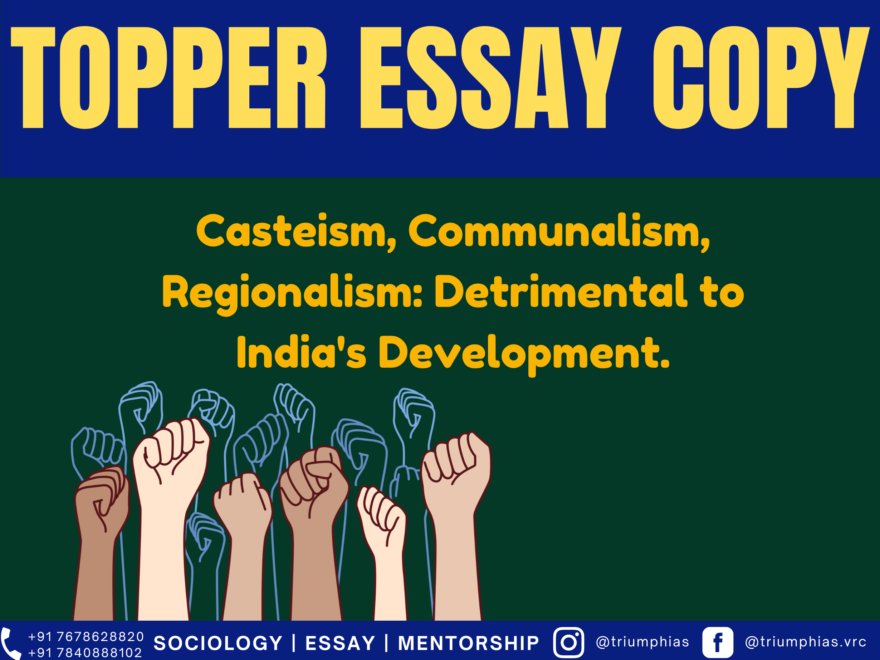IAS, SANJITA MOHAPATRA

Casteism, Communalism, Regionalism: Detrimental to India’s Development.
(Relevant for Essay Writing for UPSC Civil Services Examination)
Casteism, Communalism, Regionalism: Detrimental to India’s Development. |
To master these intricacies and fare well in the Sociology Optional Syllabus, aspiring sociologists might benefit from guidance by the Best Sociology Optional Teacher and participation in the Best Sociology Optional Coaching. These avenues provide comprehensive assistance, ensuring a solid understanding of sociology’s diverse methodologies and techniques
Meta Tags:
Urbanisation, Blessing, Disguise, Economic Growth, Cultural Diversity, Environmental Challenges, India, Social Inclusion, Sustainable Development, SDG Goals, Urbanization is a blessing in disguise, Laxman Tiwari, Laxman Tiwari upsc, Laxman Tiwari CSE, Laxman Tiwari Essay copy, Laxman Tiwari Essay test copy

Why Vikash Ranjan’s foundation Classes for Essay?
Proper guidance and assistance are required to learn the skill of writing essay topics in CSE examination. VIKASH RANJAN SIR at TRIUMPH IAS guides students according to the Recent Trends of UPSC, making him the Best Essay Teacher for Essay writing UPSC.
At Triumph IAS, the Best Essay Writing Coaching platform, we not only provide the best study material and applied classes of Essay for IAS but also conduct regular assignments and class tests to assess candidates’ writing skills and understanding of the subject.
Choose The Best Essay Writing Teacher for IAS Preparation and Know our Approach for Essay?
- The Programme is Planned & Executed in a Way that You Write a good Essay for obtaining Effective Score of 140 Plus.
- In this programme we provide Classes on
- How to INTRODUCE The Topic in Context of the THEME of the Essay
- How to Elaborate & Explain the Topic-Theme on Temporal Scale & Sectoral Scale as well as Intellectual Scale in the MAIN BODY of the Essay.
- How to Sum up the Topic in CONCLUSION in Context of the Essay Topic Theme.
- ︎We will Teach You How to use the Knowledge Matrix of General Studies & Optional to write a Good Essay more Logically and Coherently.
- After the Classes You have to “Write to Learn & Learn to Score” .This means You have to Write the Essay Test Papers & Learn from the Feedback & Discussions.
Why Essay is Important and What We Offer in “Essay Test Series”?
- Triumph’s Essay Upgradation Test Series (Under Personal Guidance of Vikash Ranjan Sir) doesn’t only focus on improving student’s linguistic skills but also focus on improving student’s ability to comprehend the topic-sentence (subject) recall & relate the facts, concepts, propose thesis-statements, and logically assimilate the ideas & counter ideas with clarity in expression on temporal & Sectoral Scales of knowledge.
- Further students are provided one-on-one INTERACTION* Session with Vikash Ranjan Sir. Students get personal feedback on their strength and weaknesses, regarding what is ‘good about their essay and what more should be done to make it a better one’ by Vikash Ranjan Sir.
Why to take up this “Essay Test Series and Foundation” Course?
- Essay is Low hanging Fruit. Marks in Essay is Effectively Contributing in Final Selection in New Pattern of Mains Exam. With a Well Developed ‘Knowledge Matrix and Rigorous Practice’, One can Score upto 160 + in Essay. So IAS Aspirants should never Ignore Essay Preparation
- Inculcating Writing Competency in Essay for IAS, which is Different from Essay in English, Essay in School and College.
Follow us :



Find More Blogs…
| Compare and contrast Karl Marx’s and Max weber’s | Karl Marx- Historical Materialism |
| Position of Women In the Modern Indian Society | Sociology: Social system and pattern variables |
keyword: Casteism, Communalism, Regionalism: Detrimental to India’s Development. Casteism, Communalism, Regionalism: Detrimental to India’s Development. Casteism, Communalism, Regionalism: Detrimental to India’s Development. Casteism, Communalism, Regionalism: Detrimental to India’s Development. Casteism, Communalism, Regionalism: Detrimental to India’s Development. Casteism, Communalism, Regionalism: Detrimental to India’s Development. Casteism, Communalism, Regionalism: Detrimental to India’s Development. Casteism, Communalism, Regionalism: Detrimental to India’s Development. Casteism, Communalism, Regionalism: Detrimental to India’s Development. Casteism, Communalism, Regionalism: Detrimental to India’s Development. Casteism, Communalism, Regionalism: Detrimental to India’s Development. Casteism, Communalism, Regionalism: Detrimental to India’s Development. Casteism, Communalism, Regionalism: Detrimental to India’s Development.


